Covid 9/1/22: Meet the New Booster
post by Zvi · 2022-09-01T14:00:01.234Z · LW · GW · 6 commentsContents
Executive Summary The Numbers Predictions Deaths Cases Moderna Sues Pfizer Meet the New Booster Physical World Modeling In Other News Monkeypox Not Covid Keeping Up With the Jones Act Bad News Good News, Everyone None 6 comments
We will soon have a new, updated booster shot only eight or so months behind schedule. Given only 30% of America is boosted even once, not many people will accept this kind and generous (if rather late) offer. It won’t make much difference even to those who take advantage of it at this point, but better to update than not update, the usual various objections aside. Hopefully this makes the next update easier.
Other things were mostly as one would expect.
This week I also wrote a long analysis of the student loan forgiveness situation.
Executive Summary
- Booster update available soon.
- Student loan forgiveness bigger than most realize.
- Monkeypox situation looking better.
Let’s run the numbers.
The Numbers
Predictions
North Carolina reported almost 500 deaths, which is obviously a backlog, so I adjusted that number to the still-rather-higher-than-reality 150.
Prediction from last week: 542k cases (-5%) and 3,030 deaths (-5%)
Results: 523k cases (-9%) and 3,183 deaths (-1%).
Prediction for next week (HOLIDAY): 420k deaths (-20%) and 2,550 deaths (-20%).
Labor Day is going to mess with reporting a bunch, so noting that this does not represent a predicted real decline in either cases or deaths.
Deaths


Cases


Moderna Sues Pfizer
Moderna is charging Pfizer with patent infringement.
Vaccine maker Moderna announced Friday that it’s suing rival drugmakers Pfizer and BioNtech for patent infringement. The lawsuit alleges the two companies used certain key features of technology Moderna developed to make their COVID-19 vaccine. It argues that Pfizer and BioNtech’s vaccine infringes patents Moderna filed between 2010 and 2016 for its messenger RNA or mRNA technology.
…
In October 2020, Moderna pledged not to enforce its COVID-19 related patents while the pandemic was ongoing, according to a statement from the company. In March this year, it said it will stick to its commitment not to enforce its COVID-19 related patents in low and middle-income countries, but expects rival companies like Pfizer to respect its intellectual property.
Moderna is not seeking to remove the Pfizer and BioNTech vaccine from the market, but is seeking monetary damages.
On the one hand, this is horrible, it was a pandemic, you use what tools you have. Moderna pledged not to enforce the patent during the pandemic.
On the other hand, fair. Moderna developed key real innovations that were foundational for the Pfizer vaccine. Pfizer should pay a license fee for that, which is all Moderna is asking for. It would not be reasonable to expect Moderna to waive this forever.
My solution would be that they agree on a reasonable fee, ideally going forward only, and that the United States happily cover the costs involved by letting Pfizer raise the price to match. Moderna deserves to be paid, and Pfizer shouldn’t have to pay, and we got orders of magnitude more benefit than all of this costs. A little bonus payment seems quite reasonable to me.
Meet the New Booster
Bivariant boosters (aka ‘updated boosters’) have been FDA approved. That only took (checks date) about 8 months longer than necessary. Weekend Reading has the write-up from a very straightforward meeting.
Should you get the new booster shot? Certainly you should get the new rather than the old, if you are getting boosted. Getting boosted is a better deal than it was prior to this authorization, once the new doses have shipped.
I do not intend to get an additional booster at this time. I consider it a reasonable decision and small mistake either way, with the note that if you are going to get boosted within the next year or so, now seems like the right time to do so.
There are standard calls for what the public ‘deserves to know’ and I would direct everyone to how we deal with flu vaccine updates. And standard ‘may’ verses ‘should’ as if people listened to that much (only 30% of America is boosted). And concerns about ‘what about the 12 year olds, you didn’t test in them specifically’ as if there was any scientific reason to need to do that.
And that’s it. No other issues here whatsoever. Finally, FDA does something right.
You didn’t think it was going to be that easy, did you?
You know, for a second there? I kinda did.
Then, of course, the inevitable.

Yes. Of course. Why would I ever doubt it? All right, what is it this time?
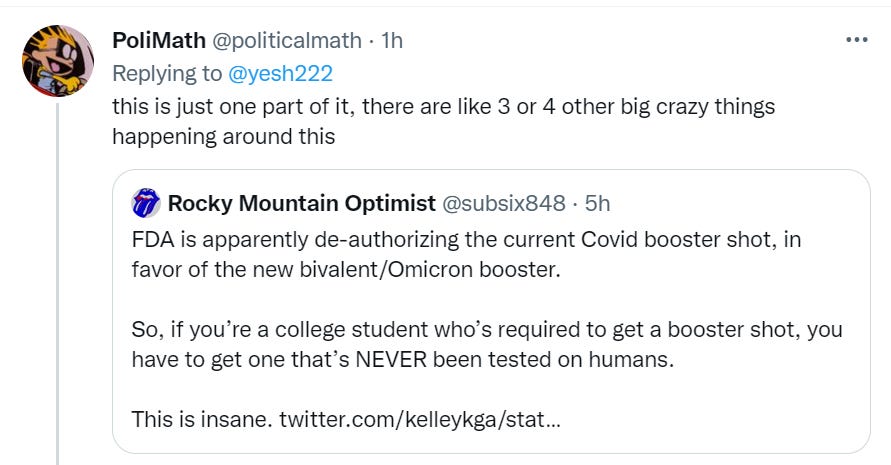


Oh. Right. That.
Once again, I’d direct everyone to the flu vaccine updates for the ‘never tested in humans’ objections. It is good that we have grandfathered in a bunch of very sensible procedures you could make such statements about, to go with all the horribly stupid other procedures we are also stuck with.
The part where the FDA withdrew approval for the old booster makes logistical sense. If both boosters were running around you’d have people running around going ‘give me the old booster’ and then they’d be told ‘we don’t have that because you’re being stupid and they spoil and we don’t keep both versions around.’ Except mostly no, the people who are not trusting the new booster weren’t about to go trust the old booster.
Except there’s the college students who might be forced to get a booster, and somehow managed not to get one until September anyway. In which case, yes, I agree that the mandate there is super dumb, although I don’t think it matters or anything. If you’re going to mandate the new booster in young people, while 70% of adults have no booster at all and the young people are at minimal underlying risk, you are not doing a reasonable or responsible thing.

Always so much to unpack in such statements. What makes a mandate for those who least need to do the thing ‘equitable’ exactly? Why do colleges uniquely need to ‘protect surrounding communities’ that are not going to be ‘well-protected’ either way and have mostly declined their own boosters. Which, to me, does not sound all that equitable. The implication that any number of lives saved justifies such an action.
Physical World Modeling
What does this man think we should do, exactly? And what value to him a school?

Presumably he thinks most schools should close, right now, until we can renovate the buildings. Wouldn’t take that many years, right? Schools are entirely symbolic anyhow.
Jill Biden has a rebound case of Covid, I have resolved my market on this accordingly. We should update in favor of this being more common, but the market already had it as pretty likely. She was no doubt tested frequently. How many get ‘rebounds’ and do not even notice? She has no symptoms, and I notice that when I saw the headline I did not consider that her health might be at risk.

The case that rebounds are a big deal.
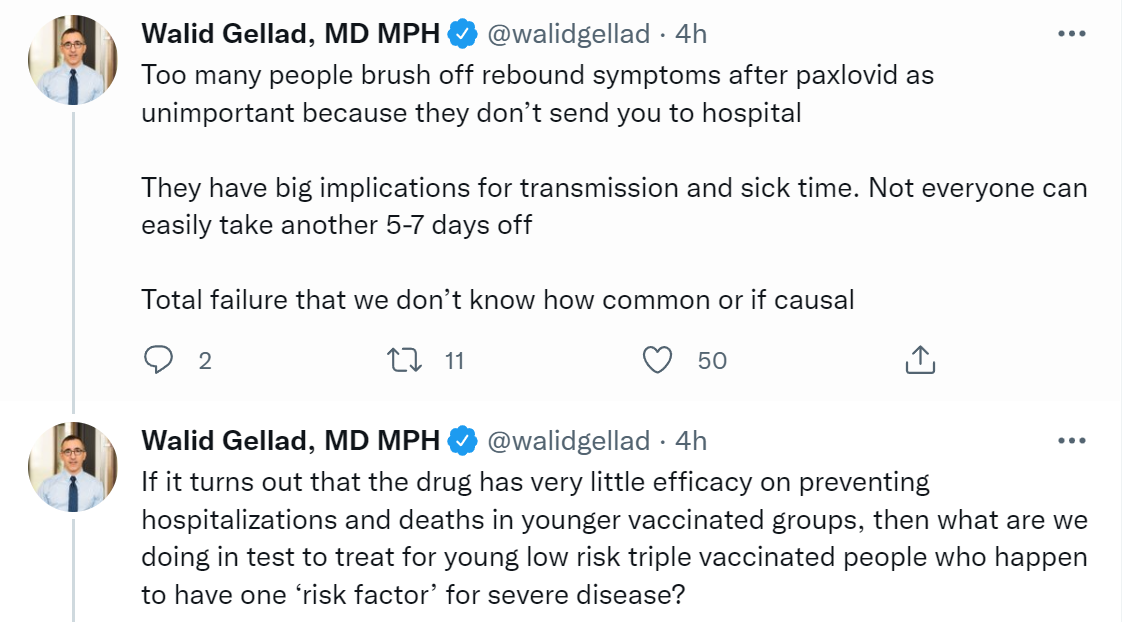

The FDA is forcing Pfizer to test the effects of a second course of Paxlovid (Bloomberg, and it’s really odd that they say ‘US regulators’ here rather than the FDA).
Agreed that we should know the frequency of rebound cases, both with and without Paxlovid, so we can plan accordingly. And agreed that being sick, even low level sick, sucks on many levels, although most rebound cases seem to be nominal rebounds without substantial symptoms. I notice that mostly the value lost is due to the additional need to isolate rather than being unable to go about one’s day.
Thus I think the more understudied question is how infectious people are during the rebound period. That’s the study we need most, because I think there is a reasonably large chance that the answer is ‘not enough to matter, you should maybe wear a mask but mostly go about your day.’
American Academy of Pediatrics lies to us once again.


This is a textbook case of the Law of No Evidence. Or it would be, if there wasn’t any Proper Scientific Evidence.
The claim that masks do not harm children’s language development is Obvious Nonsense. You know what I’ve recently noticed my six-month-old baby pays very very close attention to when I talk to him? Exactly how I am making the sounds, and then he tries to imitate them. This isn’t some bizarre hypothesis.
Then, of course, when the masks do cause delays? ‘Talk to your pediatrician.’
The stuff about how masks are ‘may be needed to keep kids safe’ is also lying. Kids do not need masks to be kept safe from Covid-19. You can argue that they might keep others safe, but that is not the claim here.
And yes, there is constant gaslighting about how no one would ever have insisted on masks in a given situation.
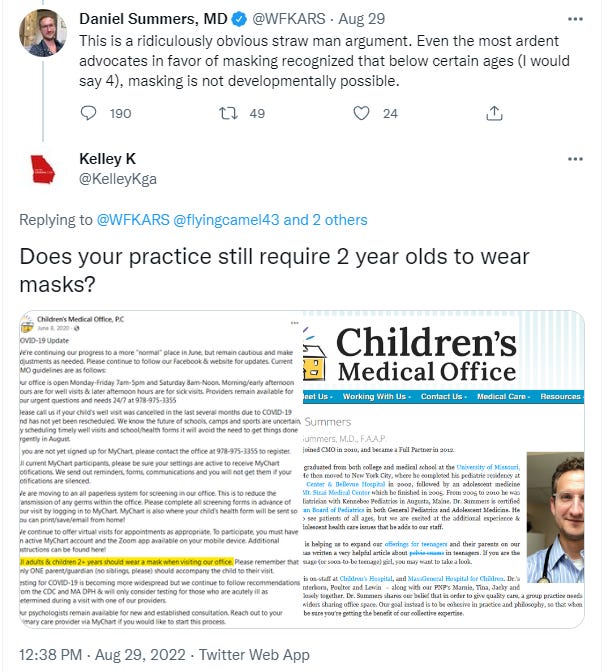
Remember, the American Academy of Pediatrics is talking about ‘the first few years’ of a child’s life in the thread above.
Bob Wachter once again crunching the numbers on risk his way. One interesting note is he expects a rapid decline in case numbers within the next 1-2 months absent a new variant. It’s unclear to what extent this is driving his continued extreme caution.
Work on universal coronavirus vaccines is not going so well. Funding is tight, but it is also about lack of other types of support.
“We want to start clinical trials tomorrow, but there are lots of barriers to getting there,” says Yale University immunologist Akiko Iwasaki, a panelist at the White House summit who has a vaccine candidate that’s administered as a nasal spray. For starters, funding remains far tighter than in the Warp Speed days: The Coalition for Epidemic Preparedness Innovations (CEPI) has invested a more modest $200 million in 11 efforts run by small companies and academics, and the U.S. National Institute of Allergy and Infectious Diseases (NIAID) has committed just $43 million in four pancoronavirus vaccine programs. And efforts also face a dearth of materials needed to make vaccines, a shortage of nonhuman primates on which to test candidates, and uncertainty about how to assess new products in populations that already have immune response to SARS-CoV-2.
Among other issues, did you know there is a shortage of monkeys for medical research? This is, of course, on top of not allowing challenge trials in humans. You would think the market would solve this one and breed more monkeys. It’s not obvious why this is not happening, but the obvious presumption is some combination of price controls and animal activists messing things up. Also plausible that it takes a while for supply to adjust to newly higher demand, but it does not seem like we are using price mechanisms to allocate what monkeys we do have to the most valuable projects. Until then, the monkeys won’t do.
In Other News
Head of FDA fails to notice the call is coming from inside the house (Science article).

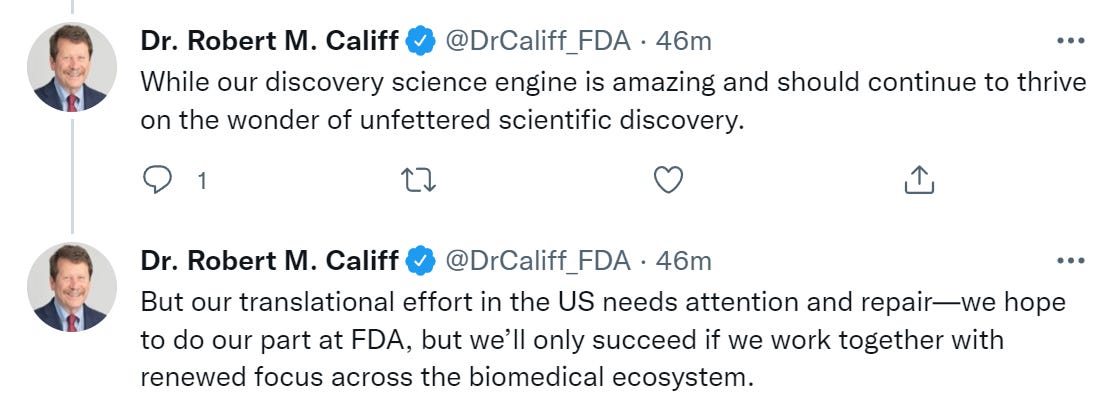
If he is curious how, as head of the FDA, he might encourage more translational effort into effective treatments, I am happy to advise him any time free of charge. Call me.
The Lockdown Files, about the early history of locking down the UK. The consequences of doing so seem to not have been well-considered. Then again, my inside source says, alas, that this is not the most reliable source. Still, there are some choice quotes.
This was the crux: no one really did. A cost-benefit calculation – a basic requirement for pretty much every public health intervention – was never made. ‘I wasn’t allowed to talk about the trade-off,’ says Sunak. Ministers were briefed by No. 10 on how to handle questions about the side-effects of lockdown. ‘The script was not to ever acknowledge them. The script was: oh, there’s no trade-off, because doing this for our health is good for the economy.’
If frank discussion was being suppressed externally, Sunak thought it all the more important that it took place internally. But that was not his experience. ‘I felt like no one talked,’ he says. ‘We didn’t talk at all about missed [doctor’s] appointments, or the backlog building in the NHS in a massive way. That was never part of it.’
There’s also this gem:
His Eat Out to Help Out campaign was designed to be an optimistic counter-narrative. ‘The survey data across Europe showed that our country was far and away the least likely to get back to normal. All the evidence was that everyone was too scared to go and do things again. We have a consumption-driven economy, so that would be very bad.’
How was policy set? No one knew, but it was by ‘SCIENCE(tm)’:
No. 10 wanted to present it as ‘following the science’ rather than a political decision, and this had implications for the wiring of government decision-making. It meant elevating Sage, a sprawling group of scientific advisers, into a committee that had the power to decide whether the country would lock down or not. There was no socioeconomic equivalent to Sage; no forum where other questions would be asked.
So whoever wrote the minutes for the Sage meetings – condensing its discussions into guidance for government – would set the policy of the nation. No one, not even cabinet members, would know how these decisions were reached.
Well, science slightly edited.
In the early days, Sunak had an advantage. ‘The Sage people didn’t realise for a very long time that there was a Treasury person on all their calls. A lovely lady. She was great because it meant that she was sitting there, listening to their discussions.’
It meant he was alerted early to the fact that these all-important minutes of Sage meetings often edited out dissenting voices. His mole, he says, would tell him: ‘“Well, actually, it turns out that lots of people disagreed with that conclusion”, or “Here are the reasons that they were not sure about it.” So at least I would be able to go into these meetings better armed.’
But his victories were few and far between.
Post on Canada’s decision to ban travel for the unvaccinated. I highlight this piece because it is illustrative of the ‘complain about everything no matter what’ style of recrimination, which doesn’t hunt. Post complains that there was no ‘scientific basis.’ That a political decision was about politics, a popular thing done before a snap election. Did the author want a study for ‘punish people who don’t do what we want means more people will do what we want?’ An exact point estimate of the reduced spread from movement restricting the unvaccinated? It complains that there were no public health experts on the team making the decision, as if that would have been helpful. Then it complains that they ended the ban and tried to stop a lawsuit against the government. And that government officials ‘shouldn’t hide behind a cloud of secrecy’ which taken this broadly is Obvious Nonsense, of course officials need to be able to have private discussions and use them to make decisions. Meanwhile, such posts somehow are still mad about the treatment of the Great Barrington Declaration, and think it will help their cause to keep harping on that, which it very clearly won’t.
Djokovic still not allowed to play the US Open due to not being vaccinated. Rather rediculous.
Monkeypox
Monkeypox has peaked, or at least reached a plateau, because the MSM community adjusted its behavior.
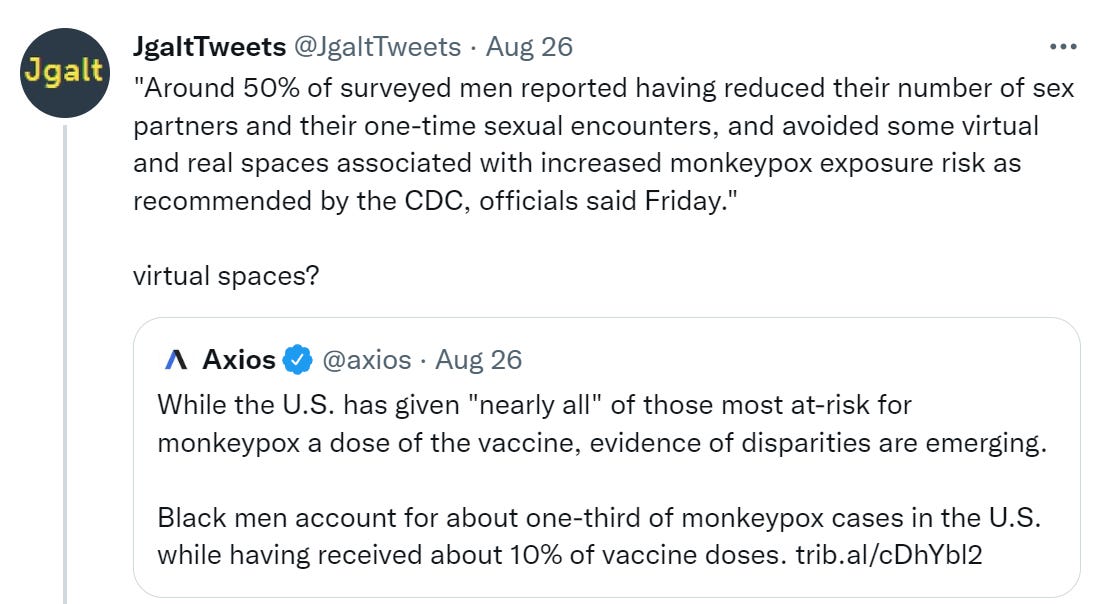

This behavior change is not long term sustainable but it does not need to be because we can put vaccine shots into the arms in question.
Of course, same as it ever was with the public health goals.

Metaculus seems a little late to the party on this one.

Each day, developments were mostly as expected, and CDC did not move to change its recommendations. Thus, each day, the probability of the recommendation should have declined slightly, rather than the bottom falling out all at once. This would be a more important bias to notice if there was real money to be won, but if there was real money to be won the bias would probably have been corrected faster. As it is, if you see a static prediction like this, ask whether that is a reasonable delta.
Should your kids be worried about monkeypox, asks latest Celine thread? No, no, no, seriously, no, stop it, not unless they are MSM with multiple partners.
USA spending $11 million to support making more monkeypox vaccines. Good. Also this being million with an M should tell you how big this problem really is.
Not Covid
Difference in people’s perspectives we need to fix: Is it more of a BS job if you only do a small amount of real work but otherwise don’t have to do BS work, or is it more of a BS job if you then fill the rest of your day with BS?


Not in bad news section because it isn’t news: Baby formula shortage crisis continues. FDA continues to deny all applications from abroad to sell baby formula. The plant at the heart of this may be starting up in several additional weeks, and may keep producing once it starts. Hope springs eternal.
From Feb 2021 on magical thinking. Endorsed.

Keeping Up With the Jones Act
There is a vigorous debate on the Jones Act.
- Is it so transparently awful that we should use it to show industrial policy in general is terrible?
- Or is the use of the Jones Act to prove the terribleness of industrial policy why we have such a transparently awful law still on the books?


Both sides make good points.
I think Matthew Yglesias is closer to my model. I would go even farther.
The Jones Act has not been repealed because it is the avatar of bad industrial policy and highly destructive rent seeking.
If we repeal the Jones Act, it would encourage us bastards who do not want your particular highly inefficient rents to continue to be paid. You know what’s so much more dangerous than the ultimate example of stupid industrial policy? The example of the repeal of the ultimate example of stupid industrial policy. You embolden the ‘general good things’ alliance against their enemies. Who knows what other rules and carve outs might get targeted next?
Can’t have that. The line must be drawn here.
You broke your little ships.
Bad News
Life expectancy continues to drop, effects seem primarily due to overdose deaths and general increased use of addictive substances rather than directly from Covid.
Technically news, but in no way a surprise: Millions in Covid aid went to retrain veterans. Only 397 landed jobs (WaPo). Patrick McKenzie explains: They’ll ~never work and ~never stop being approved because working not strictly required.
Trigger warnings are the goggles. They do nothing.
Not news but came to my attention this week: If your pilot has a mental health problem, you can rest assured they are not getting treatment for it.

New York City moves to make construction substantially more expensive.
Times Square to be made uglier via ‘gun free zone’ signs. In case you were wondering where to take your gun, or what officially counts as ‘Times Square,’ either way you’ll want to stay outside this box:
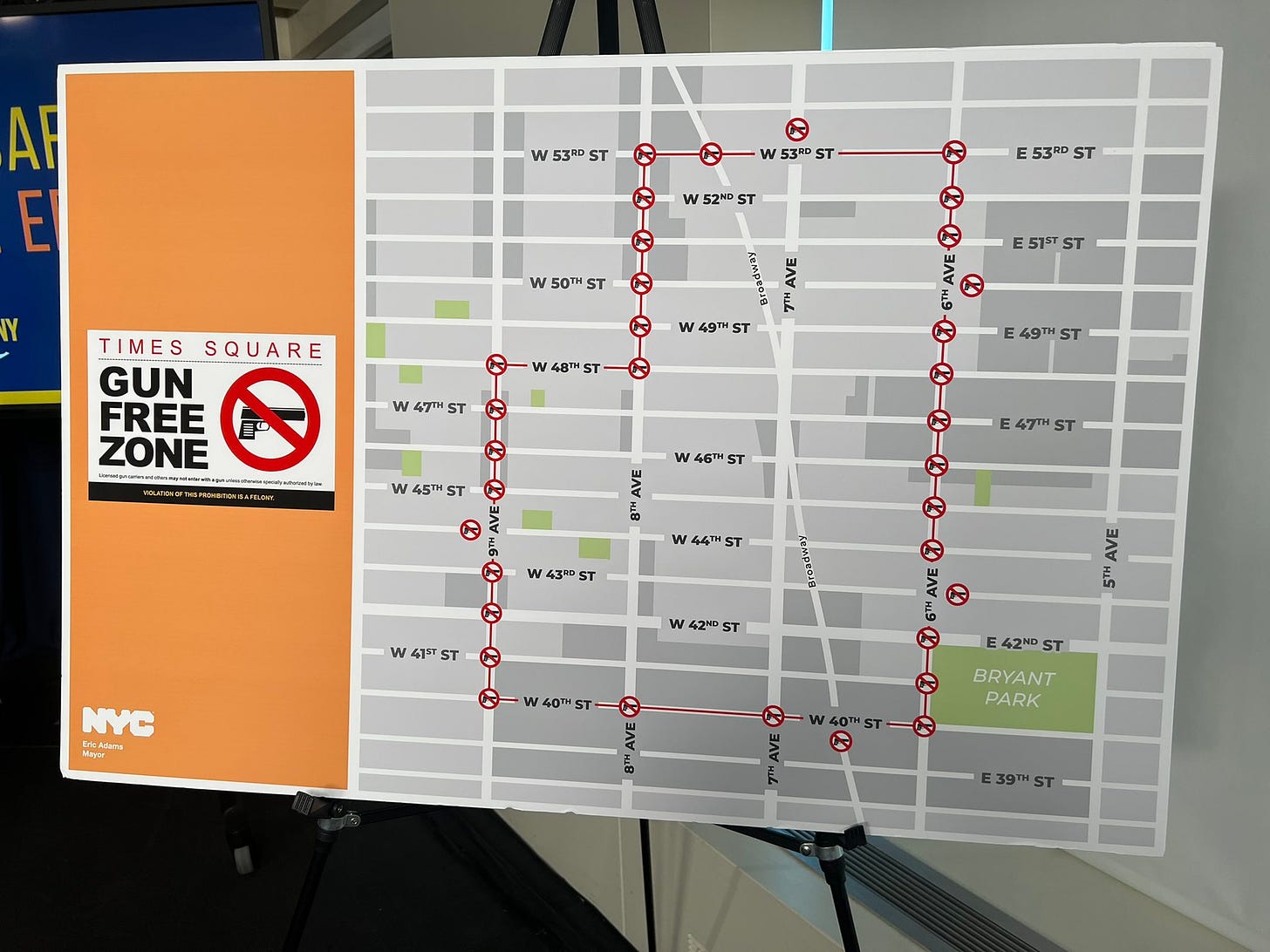
California legislature passes law to dictate fast food wages. So, more robots, then.
California senate also passes AB 2273, which age verification providers assure us won’t be that big a deal, we probably can avoid giving websites your personal information by scanning your face.

Whole thing seems blatantly unconstitutional, but if it’s not, then California is on the verge of kind of banning huge portions of the internet and otherwise causing a sufficiently large cluster**** that I am going to need more popcorn. Here’s a take from Eric Goldman saying it will ‘break the internet.’ Here is his deep dive. I am not following this too carefully but given all the requirements involved there are a lot of websites where the only legally reasonable response seems to be ‘IP block California.’
The debate between ‘things are so bad now’ and ‘it has always been thus’ continues. Matt Yglesias weighs in on part of it: Getting better policy debates is extremely difficult, they used to be even worse.
I don’t think polarization has anything to do with it because I’ve read news coverage of policy debates in the 1980s and 1990s, and it was much worse.
I really do think there’s just a kind of entrenched fandom aspect to American political culture. The bulk of the coverage centers on concepts like “X is a win for Joe Biden” or “Y is a setback for Biden” rather than trying to describe what’s happening or what the real arguments about it are. And I don’t think that’s just because the reporters are bad or the media is bad, it’s genuinely what people mostly want.
Twitch streamers experience a lot of burnout, NPR notices. This is because the incentives are strongly to stream for long periods of time, without breaks, constantly. You can’t succeed at the job by halves. This turns what would be a great job into a terrible one.
New paper from Anthropic: AI training technique that works by teaching AI to lie in order to tell people what they want to hear proves best at telling people what they want to hear. Thinks this counts as safety.
Good News, Everyone
Fear of failure is good, actually? At least in terms of results on MasterChef. What confuses me is why the conventional wisdom goes the other way. One possibility is that outcomes being bounded and comparative changes the answers here.
Excellent news indeed (direct White House link).
Today, the White House Office of Science and Technology Policy (OSTP) updated U.S. policy guidance to make the results of taxpayer-supported research immediately available to the American public at no cost. In a memorandum to federal departments and agencies, Dr. Alondra Nelson, the head of OSTP, delivered guidance for agencies to update their public access policies as soon as possible to make publications and research funded by taxpayers publicly accessible, without an embargo or cost. All agencies will fully implement updated policies, including ending the optional 12-month embargo, no later than December 31, 2025.

Counterpoint:

And more explanatory counterpoint that SciHub exists.
Tyler Cowen is skeptical that this will be of much benefit. As I understand it, the problem is that the new rule does not require the journal version to be open access, only that an open access version exists. Whereas if it did require the journal version be open access, it might put the journal out of business.
I heartily agree. Let’s do that other version. Put the journals out of business.
New York one step closer to congestion pricing for cars below 60th Street (as much as $23), Bloomberg post originally titled ‘Congestion Pricing Is Going To Be The Death of Lower Manhattan.’
If for-hire vehicles are required to pay additional tolls under New York City’s proposed congestion pricing plan, “thousands of drivers will lose their life savings,” Aziz Bah, the organizing director of the guild that represents over 80,000 drivers in the city, said Thursday night during the Metropolitan Transportation Authority’s first public hearing on the plan.
I notice that this is not how ‘supply and demand’ works. Does this person think the taxi/Uber/Lyft drivers won’t raise prices to compensate? Is it retroactive for decades, since I can’t think of another way anyone could ‘lose their life savings’?
According to the assessment, traffic in the district could drop by as much as 9% and use across the entire public transit systems could potentially increase by as much as 2%.
Sounds like demand to be in the area is rather inelastic.
California passes, with overwhelming support, housing bills AB 2011 and SB 6. If you want to be allowed to build housing where there once were stores, you now have a choice. You can either make some units artificially cheap or you can pay union wages, much better than not having a choice, and both seem feasible. As long as someone in the coalition gets paid, you’re good. One bill even gets around environmental review requirements. Here is a technical thread on AB 2011. It’s quite the legislature they’ve got over there.
Court rules that New Orleans restricting short-term rentals to city residents unconstitutionally restricts interstate commerce.
EAs are, Will McAskill claims, always thinking on the margin. This makes the neglect of general economic prosperity as a cause area that much more frustrating. How is it that there was a major macroeconomic policy push by OP that wasn’t NGDPLT?
Talking to strangers is more enjoyable than people think. Update accordingly. Notice that if you already know about how much people enjoy talking to strangers, but not how much they expect to enjoy it, then this new information becomes bad news, but I presume it is instead good news. Does this mean it is ‘that easy’? No, but it’s also not that hard.
Paul Graham agrees with me that the new GMail design is horrible. The good news is this thread made me sufficiently non-blind to find that I figured out how to switch back. It’s in the quick settings, not the full settings. Did not see that coming.
New Conboy lab paper confirms that repeated plasma dilution has lasting age-reversal effects in humans. Is it happening?
Washington Post reporters sensibly hold less zoom meetings on Fridays.
New York MTA workers hourly wages aren’t low but seem reasonable. As is usually the case, the problem isn’t the hourly pay, it’s what they don’t do in that hour.
Colleges cutting down on cafeteria perks in response to food inflation (Bloomberg).
We are safe from Scott Lincicome’s hot sauce due to overregulation. But, for how long?
6 comments
Comments sorted by top scores.
comment by mlinksva · 2022-09-01T16:48:43.469Z · LW(p) · GW(p)
a new, updated booster...won’t make much difference even to those who take advantage of it at this point
I'm planning to take advantage, but would enjoy reading an analysis of how much/little difference it can be expected to make. I guess this has been done by many people, pointers idly wanted/appreciated.
comment by Corm · 2022-09-01T18:52:33.809Z · LW(p) · GW(p)
Talking to strangers is more enjoyable than people think. Update accordingly. Notice that if you already know about how much people enjoy talking to strangers, but not how much they expect to enjoy it, then this new information becomes bad news, but I presume it is instead good news. Does this mean it is ‘that easy’? No, but it’s also not that hard.
I read the 2014 paper that this NYT article refers to. They ran the experiment on METRA which is a very white commuter line from Chicago Suburbs into downtown Chicago. Sample size less than 200, mean age 49 (SD 13). So it's unclear how generalizable this study is to other contexts.
It is especially interesting that the NYT article chose to use the 2014 paper when the same author published a 2021 paper with basically the exact same setup but in the London Underground (and with a ~4x larger sample size) which I would expect to have a significantly less homogenous makeup (and therefore possibly more generalizable) than METRA. This is probably b/c while the 2021 paper did find that people somewhat underestimated how much they would enjoy talking, the control group had a larger underestimate of how much they would enjoy doing control things. So there was a larger difference between actual enjoyment and expected enjoyment in the group that was told to do whatever they normally do on their commute than the group that was told to talk to whoever sat next to them.
I will say that ignoring the difference between expected enjoyment and actual enjoyment being inconclusive here, in the london underground paper people expected to most enjoy talking to strangers AND did most enjoy talking to strangers. So it is somewhat interesting that people generally choose to not talk to others despite both expecting and realizing the most enjoyment by talking to others. Maybe there's some tail risk considerations here where better avg commute isn't worth 1/10k chance of talking to someone who decides to stalk you etc.
comment by ChristianKl · 2022-09-01T15:03:00.324Z · LW(p) · GW(p)
I notice that this is not how ‘supply and demand’ works. Does this person think the taxi/Uber/Lyft drivers won’t raise prices to compensate? Is it retroactive for decades, since I can’t think of another way anyone could ‘lose their life savings’?
That person writes:
The fees will not come from the pockets of Silicon Valley billionaires, but from the pockets of hard-working New Yorkers. New Yorkers that have invested in driving, pouring their life savings into the industry.
[...]
That being said, we simply cannot absorb another fee or another tax. Even if it is paid for by the
consumer, the ultimate impact will be on the drivers in lost business and income. And in order to
remain competitive, we fear the app-companies will simply lower their rates, again, impacting
driver income. For-hire vehicle travel in New York City cannot be seen as an untapped source of
funding for the state, city and MTA. This must stop as it is only hurting the working class, poor
and immigrant communities and drivers.
comment by Ben Smith (ben-smith) · 2022-09-29T19:04:31.629Z · LW(p) · GW(p)
American Academy of Pediatrics lies to us once again....
"If caregivers are wearing masks, does that harm kids’ language development? No. There is no evidence of this. And we know even visually impaired children develop speech and language at the same rate as their peers."
This is a textbook case of the Law of No Evidence. Or it would be, if there wasn’t any Proper Scientific Evidence.
Is it, though? I'm no expert, but I tried to find Relevant Literature. Sometimes, counterintuitive things are true.
https://www.researchgate.net/publication/220009177_Language_Development_in_Blind_Children:
Blindness affects congenitally blind children’s development in different ways, language development being one of the areas less affected by the lack of vision.
Most researchers have agreed upon the fact that blind children’s morphological development, with the exception of personal and possessive pronouns, is not delayed nor impaired in comparison to that of sighted children, although it is different.
As for syntactic development, comparisons of MLU scores throughout development indicate that blind children are not delayed when compared to sighted children
Blind children use language with similar functions, and learn to perform these functions at the same age as sighted children. Nevertheless, some differences exist up until 4;6 years; these are connected to the adaptive strategies that blind children put into practice, and/or to their limited access to information about external reality. However these differences disappear with time (Pérez-Pereira & Castro, 1997). The main early difference is that blind children tend to use self-oriented language instead of externally oriented language.
I don't know exactly where that leaves us evidentially. Perhaps the AAP is lying by omission by not telling us about things other than language that are affected by children's sight.
That's a bit different to the dishonesty alleged, though.
comment by tkpwaeub (gabriel-holmes) · 2022-09-01T15:16:54.494Z · LW(p) · GW(p)
In the specific case of Moderna vs Pfizer, maybe an equitable trade secret swap? Pfizer could simply agree to let Moderna produce its own version of Paxlovid.
In the long run, we really need to revisit the Bayh-Dole Act. It's not unreasonable for the government to retain some rights to intellectual property that's the result of federally funded research, whether it's from grants or because the government agrees ahead of time to purchase the finished product.
comment by Nanda Ale · 2022-09-04T05:55:15.481Z · LW(p) · GW(p)
CVS is scheduling boosters immediately, even Sunday, today. Walgreens doesn't seem to start until next week. I'm scheduled for a Modern today, specifically because it was the most MRNA. Let's get that immune system rockin.
On This Week In Virology the doctor said from the beginning everyone has been noticing a Covid rebound-like pattern, sometimes but not always associated with the cytokine storm phase. A first week of symptoms, a second week with an apparent lessening of symptoms or even recovery, and then symptoms returning, and in rare cases even worse than the initial symptoms. And that in his treatment experience this pattern is not particularly more common with Paxlovid patients than it was before.